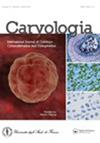Meiotic behavior during microsporogenesis, responsible for male sterility in some species of Salvia sect. Aethiopis in Iran
IF 2.1
4区 生物学
Q2 Agricultural and Biological Sciences
引用次数: 0
Abstract
The genus Salvia L. (Lamiaceae: tribe Mentheae) contains about 1000 species. Section Aethiopis in this genus has a distribution in the Mediterranean and central Asia and contains about 34 species in Iran. This study aimed to investigate the chromosome number and meiotic behavior in five species of Salvia sect. Aethiopis. To this end, pollen mother cells were used, and the squash method was employed. The results showed that S. persepolitana and S. spinosa had a chromosome number of 2n=2x=20, while S. sclarea, S. hypoleuca, and S. limbata had a chromosome number of 2n=2x=22. The study of meiotic behavior revealed the presence of abnormalities such as chromosome stickiness, cytomixis, non-synchronous segregation, chromosome bridges, laggard chromosomes, formation of micronuclei in tetrad cells, formation of tripolar cells, and pentapolar with different frequencies in the studied species. The meiotic index was reported as the highest in S. persepolitana and the lowest in S. hypoleuca. Pollen fertility was also affected by meiotic abnormalities, showing a decreasing trend from S. persepolitana to S. spinose. Meiotic abnormalities may have played a role in the evolution of aneuploidy and polyploidy in the Salvia genus.小孢子发生过程中的减数分裂行为是造成伊朗丹参科某些物种雄性不育的原因。伊朗的 Aethiopis
丹参属(Lamiaceae: tribe Mentheae)包含约 1000 个物种。该属的丹参科(Aethiopis)分布于地中海和中亚地区,在伊朗约有 34 种。本研究旨在调查丹参属 Aethiopis 科 5 个物种的染色体数目和减数分裂行为。Aethiopis.为此,研究人员使用了花粉母细胞,并采用了壁球法。结果表明,S. persepolitana 和 S. spinosa 的染色体数为 2n=2x=20,而 S. sclarea、S. hypoleuca 和 S. limbata 的染色体数为 2n=2x=22。对减数分裂行为的研究表明,所研究的物种中存在染色体粘着、细胞混杂、非同步分离、染色体桥、染色体滞后、四分体细胞中微核的形成、三极性细胞的形成和五极性等异常现象。据报道,S. persepolitana 的减数分裂指数最高,S. hypoleuca 的最低。花粉育性也受减数分裂异常的影响,从 S. persepolitana 到 S. spinose 呈下降趋势。减数分裂异常可能在丹参属非整倍体和多倍体的进化过程中起到了一定的作用。
本文章由计算机程序翻译,如有差异,请以英文原文为准。
求助全文
约1分钟内获得全文
求助全文
来源期刊

Caryologia
生物-遗传学
CiteScore
1.60
自引率
23.80%
发文量
26
审稿时长
12 months
期刊介绍:
Caryologia is devoted to the publication of original papers, and occasionally of reviews, about plant, animal and human karyological, cytological, cytogenetic, embryological and ultrastructural studies. Articles about the structure, the organization and the biological events relating to DNA and chromatin organization in eukaryotic cells are considered. Caryologia has a strong tradition in plant and animal cytosystematics and in cytotoxicology. Bioinformatics articles may be considered, but only if they have an emphasis on the relationship between the nucleus and cytoplasm and/or the structural organization of the eukaryotic cell.
 求助内容:
求助内容: 应助结果提醒方式:
应助结果提醒方式:


